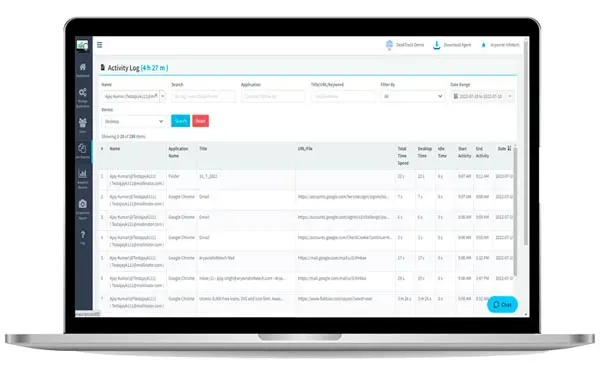In the age of remote work, managing employee productivity is more challenging than ever. HR managers are tasked with ensuring that employees are working efficiently while maintaining a healthy work-life balance. One way to achieve this is through app usage tracking, a powerful tool that allows HR managers to monitor how employees use applications and websites during work hours. In this article, we’ll explore why app usage tracking is essential and how it can help HR teams optimize workforce performance.
What is App Usage Tracking?
App usage tracking refers to the process of monitoring and analyzing the time employees spend on different applications and websites during work hours. This data provides HR managers with valuable insights into employee behavior, helping them identify areas of improvement, prevent distractions, and boost productivity.
With the right employee monitoring software, HR managers can track app usage across desktops, mobile devices, and even specific software tools. This can include:
Monitoring time spent on business-critical applications.
Tracking time spent on non-work-related apps.
Analyzing productivity patterns across teams.
Read more👉 Top 10+ Effective Workload Management Strategies
Why HR Managers Should Prioritize App Usage Tracking
1. Improve Productivity and Efficiency
App usage tracking helps HR managers identify how much time employees spend on productive tasks versus non-work-related activities. By pinpointing distractions, managers can take appropriate actions to:
Minimize time spent on non-productive apps: Limit access to social media, entertainment apps, or websites that are not work-related.
Encourage focus: Identify peak productivity times and encourage employees to work during those periods.
This insight can lead to increased overall productivity and efficiency across the workforce.
2. Prevent Time Wasting
HR managers often face the challenge of ensuring that employees stay focused and avoid wasting time on unproductive activities. Without monitoring tools, it can be difficult to determine where time is being spent.
PC activity trackers allow HR managers to track desktop activities, such as which apps are being used and for how long. For example, an employee who spends excessive time on social media might need a gentle reminder to refocus on work. By monitoring app usage, managers can:
Identify and address time-wasting habits.
Encourage responsible use of time by implementing guidelines or policies for app usage.
3. Enhance Employee Accountability
When employees know that their app usage is being monitored, it fosters a sense of accountability. Monitoring tools like employee monitoring software provide a clear view of how much time is spent on various tasks, ensuring that employees stay responsible for their work.
Key benefits of increased accountability include:
Clear performance benchmarks: Employees can track their own performance based on the time they spend on tasks.
Transparency in time allocation: HR managers can provide feedback on how time is being allocated to different tasks or projects.
Fair and accurate evaluations: Using data from app usage tracking ensures that performance reviews are based on objective insights.
4. Optimize Remote Work Performance
With remote work becoming more prevalent, HR managers face the added challenge of overseeing employees working from different locations. Traditional methods of performance management, such as in-person check-ins, are no longer feasible. App usage tracking and employee monitoring software provide HR managers with a way to monitor remote employees effectively.
Track time across multiple devices: Employees may be using different devices to perform work tasks. App usage tracking allows HR managers to monitor all devices, ensuring consistent productivity across platforms.
Monitor software usage: For teams working on specific tools, such as design software, CRM platforms, or project management tools, tracking usage helps ensure the software is being used effectively.
With app usage tracking, HR managers can gain real-time insights into remote employee performance, ensuring that remote teams remain as productive as in-office teams.
Key Features to Look for in App Usage Tracking Tools
When selecting employee monitoring software to track app usage, HR managers should consider the following features:
1. Comprehensive Application Monitoring
A good PC activity tracker will offer detailed insights into the apps and websites employees use during work hours. It should monitor all relevant desktop, mobile, and web applications, providing an accurate picture of employee activity.
2. Real-time Reporting and Alerts
Real-time reporting is essential for HR managers to stay on top of employee activity. Software that offers instant alerts or notifications when an employee spends excessive time on non-work-related apps can help prevent productivity losses before they become a problem.
3. Productivity Reports
Tracking app usage alone is not enough. HR managers need detailed productivity reports that analyze how employees’ time aligns with business goals. The best employee monitoring software will provide reports that categorize apps as productive or non-productive, making it easy for HR teams to assess performance.
4. Customization and Flexibility
Every organization has different needs. Therefore, it’s crucial to choose software that allows HR managers to customize the tracking settings. Features such as setting app usage limits or defining productivity thresholds help tailor the software to your organization's specific needs.
Read more👉 Why is Employee Productivity Tracking Software Needed in 2025?
Implementing App Usage Tracking in Your Organization
To successfully implement app usage tracking, HR managers should follow these steps:
Communicate with employees: Inform employees about the use of monitoring software and emphasize the benefits, such as improving productivity and ensuring fair performance evaluations.
Set clear guidelines: Define acceptable app usage during work hours. Be clear about which apps are essential for work and which are not.
Use insights to provide feedback: Use the data gathered from app usage tracking to offer constructive feedback to employees. Address time-wasting habits and highlight areas of improvement.
Conclusion
App usage tracking is an invaluable tool for HR managers looking to optimize workforce performance. Whether managing remote teams or overseeing in-office employees, tracking app usage with PC activity trackers and employee monitoring software helps improve productivity, reduce time-wasting, and foster a culture of accountability. By implementing the right software, HR teams can gain valuable insights into employee behavior, leading to more efficient and productive teams.
